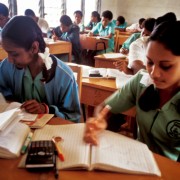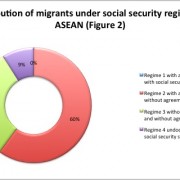
About Gloria Pasadilla
Gloria O. Pasadilla is Research Fellow at the ADB Institute. Her research focuses on trade and social protection issues. She has co-edited several books and published various works as book chapters and journal articles. Prior to joining ADBI, she was Senior Economist at the Philippine Institute for Development Studies and consultant for the trade and foreign affairs departments, as well as international organizations.Reforming Asia’s Trade in Services will Help Human Development

The services sector is becoming increasingly important in modern economies. In many of the most developed economies, it can represent two–thirds or even three–quarters of all economic activity. Even in developing economies, the services sector often accounts for a significant share of economic output and employment. International trade in services is also increasing in importance, and has been growing more rapidly than goods trade over recent years. It has also proven to be more resilient to the global financial crisis and resulting trade collapse. It has long been recognized that services trade can influence economic and social outcomes through a variety of mechanisms.
Portable Social Security for ASEAN Migrants

The movement of workers within the ASEAN region has been on the rise over the last two decades. In Malaysia, for example, the number of foreign workers grew from less than 250,000 in 1990 to more than 2 million in 2007, about 67% of whom come from ASEAN countries. Singapore, Brunei Darussalam and Thailand have become major labor recipients, while the other ASEAN countries are labor senders (Figure 1). However, the ease of labor flows within ASEAN is not matched by the portability of migrants’ social security benefits. Some hosting countries have nationality conditions or minimum residency requirements that prevent migrants from participating in social security schemes.


Search
Subscribe / Connect to Asia Pathways
Subjects
- Accelerating Progress in Gender Equality
- Addressing Remaining Poverty and Reducing Inequality
- Agriculture and natural resources
- Capacity development
- Climate change
- Economics
- Education
- Energy
- Environment
- Finance sector development
- Gender
- Governance and public sector management
- Health
- Industry and trade
- Information and Communications Technology
- Infrastructure
- Making Cities More Livable
- Miscellaneous
- Population
- Poverty
- Private sector development
- Regional cooperation and integration
- Sanitation
- Social development and protection
- Strengthening Governance and Institutional Capacity
- Subjects
- Transport
- Uncategorized
- Urban development
- Video Blog
- Water
Recent Posts
- Investing in Childcare a Win for Women and the Economy
- Flush and Flourish: Upgraded Toilets Can Transform Lives in Rural Asia
- New Ways for Climate Finance and Development in Asia and the Pacific
- Rethinking High-Rise Living: Balancing Urban Growth and Sustainability in Asia’s Cities
- Navigating Linear Transport Infrastructure Through Conservation Landscapes




Recent Comments